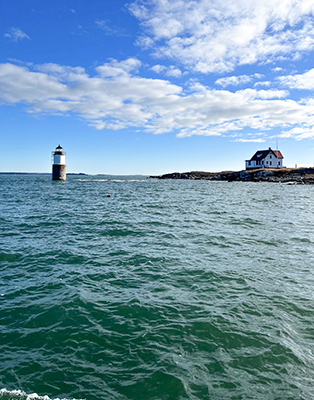
Ram Island Light had its 214-foot walkway between the island and lighthouse destroyed by the January 2024 storms.
(Ram Island Preservation Society photo)
Following the destructive storms of January 10 and 13, 2024, Maine Governor Janet Mills proposed emergency legislation in the form of Bill LD 2225, “An Act to Provide Funding to Rebuild Infrastructure Affected by Extreme Inland and Coastal Weather Events.”
The Bill’s first hearing before the Joint Standing Committee on Appropriations and Financial Affairs occurred at the State House in Augusta on March 6, 2024. The Bill’s original summary (prior to being amended) read:
“This bill transfers $50,000,000 from the Maine Budget Stabilization Fund to the Department of Transportation, Infrastructure Adaptation Fund, Other Special Revenue Funds account for municipal, state or regionally significant infrastructure adaptation, repair and improvements that support public safety, protection of essential community assets, regional economic needs and long-term infrastructure resiliency. Project types may include working waterfront infrastructure, culverts, storm water systems, water system upgrades and other interventions that support reducing or eliminating climate impacts, especially coastal and inland flooding.”
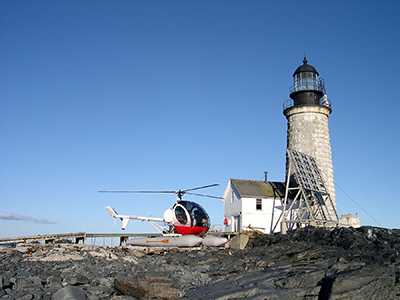
Halfway Rock Light Station in Casco Bay suffered heavy damage during the January 2024 storms.
(Photo by Ford Reiche)
The American Lighthouse Foundation (ALF) felt strongly that Maine’s lighthouses are vital components of coastal infrastructure, and thus, were worthy of inclusion in this emergency legislation. Wishing not to divert any of the $50M requested by the Governor from the many needs of Maine’s working waterfront, ALF presented testimony to members of the Appropriations and Financial Affairs Committee asking that an additional $12M be allocated in L.D. 2225 for storm-damaged lighthouses.
ALF Executive Director Bob Trapani, Jr. presented testimony to the Committee, followed by supporting testimony from Chris Hall of the Friends of Seguin Island Light Station and Gigi Lirot of Whitehead Light Station. Written testimony in support of this request was also provided by Ford Reiche of Halfway Rock Lighthouse and Karen Dombrowski of Goat Island Lighthouse.
The following is the submitted testimony presented by Bob Trapani, Jr. to the Committee on Appropriations and Financial Affairs on March 6, 2024:
“Chair Rotundo, Chair Sachs, and honorable members of the Committee on Appropriations and Financial Affairs:
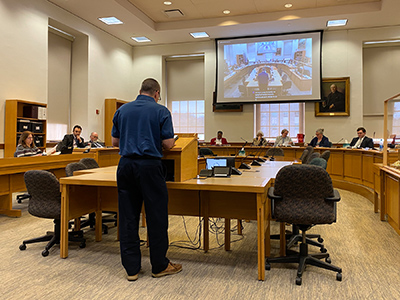
ALF Executive Director Bob Trapani, Jr. testifying before the Joint Standing Committee on Appropriations and Financial Affairs at the State House on 3/6/24.
(Photo by Ann-Marie Trapani)
“Good afternoon. My name is Bob Trapani, Jr., Executive Director of the nonprofit American Lighthouse Foundation. I am here today to testify on behalf of Maine’s historic lighthouses as it relates to LD 2225, “An Act to Provide Funding to Rebuild Infrastructure Affected by Extreme Inland and Coastal Weather Events.”
“The two coastal storms of January 2024 marked a turning point for Maine. The widespread damage was nothing short of riveting. In the wake of these devastating weather events, it is clear that we can no longer be complacent with our efforts to protect Maine’s most vulnerable and precious coastal resources, which includes lighthouses.
“Following the storms, Ford Reiche of The Presumpscot Foundation and I surveyed two dozen lighthouses by helicopter. We saw firsthand the terrible toll these two storms had taken on lighthouses statewide. The storm damage is in the millions.
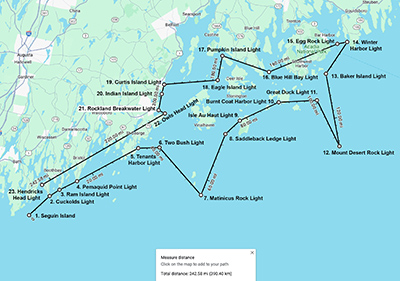
The January 21, 2024 helicopter flight undertaken by Ford Reiche and Bob Trapani, Jr. to survey the extent of Maine’s storm-damaged lighthouses.
(Graphic by Dominic Trapani)
“Maine’s lighthouses – 66 in all, are some of the most historic and picturesque in the country, and are irreplaceable pillars of the Maine Brand. But they need our help. Lighthouses stand on the frontlines of every storm, a changing climate and rising sea levels. Therefore, we need to act today to make lighthouses more resilient.
“Why are lighthouses so important?
“For the last two centuries, Maine’s lighthouses have helped save countless lives. Most still serve as active aids to navigation. Fishermen, recreational boaters and kayakers can attest to the lifesaving capabilities of a lighthouse when the need arises.
“However, just as importantly, lighthouses are a vital component of Maine’s present day economy – beckoning residents and visitors alike to spend ample time along our rugged coastline and islands. People seek lighthouses out for their unique sense of place, to experience their history, admire their architecture and enjoy the natural beauty surrounding them.
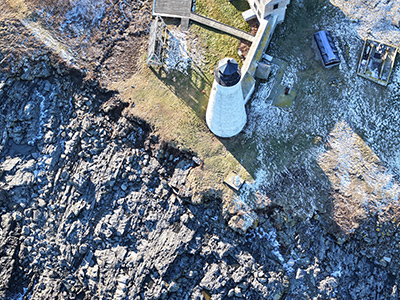
The January 2024 storms exacerbated erosion that continues to encroach upon the lighthouse and badly damaged the boathouse – moving it off its foundation.
(Photo by Josh McPhail)
“Lighthouses help ‘light’ the way for Maine’s tourism and outdoor recreation economy. Maine’s Office of Outdoor Recreation has noted, “Outdoor recreation contributed $3.3 billion to Maine’s economy in 2022 – nearly 4% of the gross domestic product.”
“In addition, according to the Maine Office of Tourism, 51% of visitors in 2023 listed “enjoying the ocean views/rocky coast” as an activity, and 17% visited historic sites/museums. There is no doubt that lighthouses contribute mightily to the economic success and growth of Maine’s tourism and outdoor resources.
“In closing, I am requesting an additional $12 million dollars be transferred from the Maine Budget Stabilization Fund to the Department of Transportation for Maine’s lighthouses. The $12 million dollars being requested is in addition to that already provided for in the proposed legislation. We do not wish to divert funds away from roads, bridges, coastal areas and communities, all of which undeniably need resources as well.
“The additional funds we are requesting will provide mitigation investments to protect against the adverse effects posed by future storms, which promise to be more intense and more frequent, as well as rising sea levels. The requested funds could also serve as a match for any available Federal disaster funds or ineligible costs.
“Why is this funding so critical?
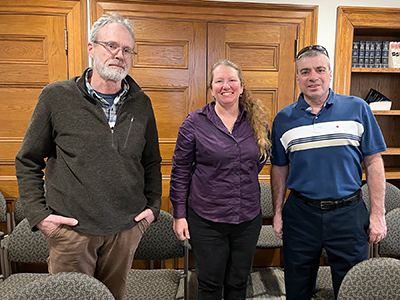
(L to R) Chris Hall, Friends of Seguin Island Light Station, Gigi Lirot,Whitehead Light Station and Bob Trapani, Jr., American Lighthouse Foundation.
(Photo by Ann-Marie Trapani)
“Nonprofit organizations serve as the steward for 40% of Maine’s lighthouses. These nonprofits work extremely hard to raise much-needed funds for the general maintenance and care of these lighthouses. However, the costs of this storm damage is simply above and beyond the capacity of what nonprofit organizations can provide for on their own. There are very few funding resources available to nonprofits for assistance with storm recovery, let alone addressing diverse mitigation measures so desperately needed.
“Such an investment by the Maine Legislature will ensure our lighthouses are made more resilient – thus protecting and sustaining an important asset of Maine’s tourism and outdoor recreational economy. This investment will also safeguard some of our most beloved historic and cultural resources in their time of greatest need. That time is now. Thank you.”
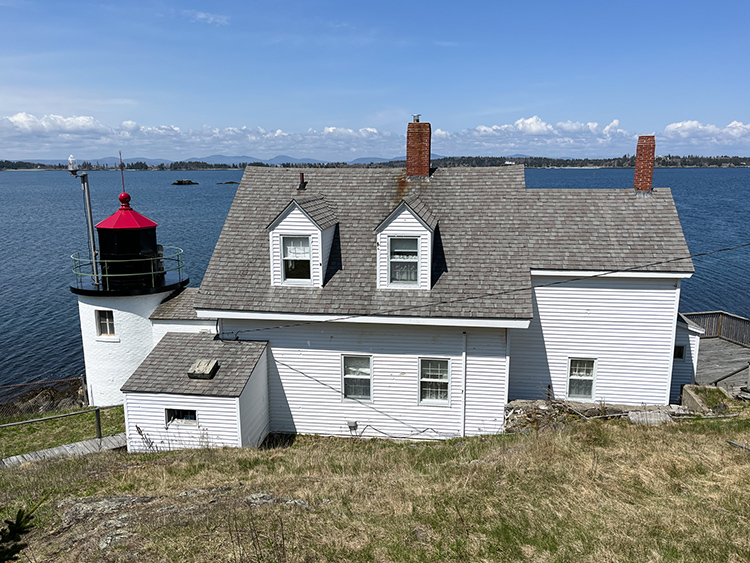
Browns Head Light on Vinalhaven, which is owned by the Friends of Browns Head Lighthouse, suffered damage during the January 2024 storms. The station’s vital retainer wall was damaged and erosion along the lawn and rock ledge encropments out in front of the light station occurred.
(Photo by Bob Trapani, Jr.)

